Electronics surround our everyday life but, oddly enough, many of us still don’t even know what makes a clock tick. Building a better understanding of electronics for every generation is the goal of Circuit Scribe. Produced by the company Electroninks, it’s a rollerball pen that lets you create circuits on paper. The pen makes it easier for novices to understand basic circuits while enabling the professionals to build complex prototypes.
CEO of Electroninks Brett Walker talked to us about going straight from PhD to CEO, building a common mission in a small team, and how allowing kids too much tablet-time can stifle the imagination.
How did Circuit Scribe come to life?
”My PhD revolved around conductive inks, which started to gain commercial interest at the time. I decided to make the company Electroninks inc. And we started doing business-to-business. We quickly ran into the problem of non-disclosure agreements. We were doing cool work but had very little way to disclose that to anyone, so we decided to introduce a consumer product. We were working on Circuit Scribe, and when we launched a Kickstarter during the Holidays of 2013, it went exceptionally well. We raised USD 675,000 in a little over 30 days. There was clearly a consumer demand.”
What happened from there?
“Over the next two or three quarters, we spent all the raised money hiring industrial designers to make our product off-the-shelf and ready-to-use, getting all our certification testing. Since then, we’ve expanded the consumer product line with Circuit Scribe and are now globally distributed. Our industrial brand has also reaped benefits from this as well, because of how far the Circuit Scribe brand precedes us as a company.”
What’s it like taking the leap from PhD to entrepreneur?
“The most exciting part was the big interest. I didn’t plan on starting a business right off a PhD, but, it was obvious that there was a demand. Then there was the challenge of going from a great idea to gain the funding, necessary resources and infrastructure to turn it into a product. In the beginning, it was just me screwing around in a lab, doing pretty much everything. Then I got a few interns, had a Co-founder join me, and the snowball started to build.”
How did you build your mission with human capital?
“It’s the most important process. It’s critical that you make sure your values align with new hires. You have to have an honest relationship because the first few people really do set the tone for what type of company it’s going to be. It can’t be overstated how important that process is.”
How would you describe your product?
“In its simplest form, it’s a rollerball pen filled with non-toxic conductive ink that dries immediately at room temperature on normal paper. So as quickly as you can doodle on a normal piece of paper, you can create a circuit prototype. It’s simple enough for a toddler to weigh into and complicated enough for an elephant to drown in, so to say. We meet people at a very young age and teach them basic concepts, while the people who already know what they’re doing can do extremely complex things — things we hadn’t even imagined. The tool itself is extremely flexible and gives us a wide range of ways to approach the market from a very broad perspective.”
What’s your take on the debate about planned obsolescence in electronics?
“I definitely agree that planned obsolescence is obvious and now companies must, at least, admit it. Another problem I see is the lack of creativity that goes into products. You’re given an iPad as a building block, and I think that fundamentally limits your creativity — it's such a complex device where so many engineering decisions have already been made. This is where Circuit Scribe comes in, allowing you to prototype things, understand how the basic circuits are working and access electronics in a very straight-forward, screen-free way."
What’s your biggest challenge right now?
“It’s having the privilege and good fortune of needing to scale rapidly. Right now, we're employing 24 people, and we’re in the process of hiring 12-14 over the next six to eight months. And as we’re growing, you can never be too careful and meticulous as far as how you hire. Each hire in a small company can have a huge impact."
-
Image: Circuit Scribe




